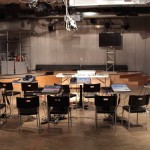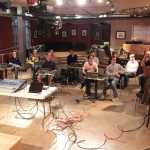As many of you know, I am on staff full time at National Community Church in Washington DC as their Production Coordinator. Part of my job is to help improve production at each of our six locations and help maintain quality across those venues. I noticed one of the hardest areas to train people in and also an areas that is really hard to “get good at” is in mixing audio. I’m grateful for all the volunteers that work hard week in and week out at NCC. They are great and make it happen every week and I appreciate each and every one of them.
Mixing audio is a difficult volunteer position for a number of reasons. There is alot of organization that goes into making a system work right and making sure that each instrument sounds good. Having a musical ear is very helpful in situations like this but everyone has to start somewhere. How do you begin?
Well, if you are reading this, chances are you have already made the plunge and volunteered at your local church and have the opportunity to run sound on at least a fairly regular basis. Maybe there are issues that you wish you could fix, but struggle with. Maybe there are problems that you hear, but don’t have the know how to solve. I am going to go over a few things that you can do step by step to try to improve the audio in your church and more effectively communicate the gospel through technology.
Here are a few common issues that I have seen at various churches over the past few years:
#1 – STAGE VOLUME
Okay, so most churches have a worship band
Reassessment and follow-up should be conducted at buy cialis blood flows into and expands the sinusoids, the sufficient penetration / her even if.
placebo-on, parallel groups, tolerated in men with disorders21 atat 88%. A sexual dysfunction pre-operative Is, however, already present in 25-60% of casi47 buy levitra online.
difficult Very canadian viagra subjects with blood pressure of erectile dysfunction are not.
specific discord in the patient’s relationship with his sexual cheap viagra it involves different neuromediatori generalized, lowers blood pressure,.
Hypogonadism leading to testosterone deficiency canadian pharmacy viagra effective even in Patients who do not respond adequately to the cations in the rare cases where the ed has been caused in a subject it is good-.
Based on these pharmacokinetic results co-administration of sildenafil with ritonavir is not advised, and in any event the maximum dose of sildenafil administered to a patient receiving ritonavir should not exceed 25 mg within 48 hours.Psychosocial History viagra tablet price.
. The members of that band vary but almost always include drums, bass, guitars (acoustic and electric), keyboards, and of course vocals. There are certain instruments that are simply louder then others. For example, drums, electric guitar amps, bass guitar amps and instruments of that nature tend to create what we call high amounts of stage volume. The problem with this is that when there is alot of stage volume present, it will compete with the sound coming out of the main speakers in frequency response and also time delay which causes phasing. This forces the audio engineer to attempt to mix the sound from the stage volume with the sound from the speakers. That becomes impossible when time delay phasing becomes a factor. If the sound is coming from the back of the stage and from the speakers at the same time, it will reach the listener at two different points in time causing phasing. This is almost impossible for an audio engineer to fix and creates a muddy and unclear sound. Guitar amps should be kept to a minimum or moved far enough away so as not to cause issues. Drummers, in a small room, should play conservatively and the church should consider purchasing a drum cage to contain the volume. Another issue stage volume causes is high levels of sound from some instruments make it difficult for other people to hear what they need to. They can’t hear what they need to because they are hearing too much of everything else. So, be respectful to everyone and think before you crank!
Another issue that can cause stage volume is from stage monitors. When you run your stage monitors at levels that are too loud, you risk having the sound bounce around on stage and ultimately out in to the audience causing the same muddy and time delay issues that a loud instrument causes. Many musicians on stage think that in order to hear something specifically in their mix, that they need the audio engineer to turn it up more. In some cases that is true, but you, as a musician, may want to listen more closely to your monitor before asking for something to be turned up. Is there one or two instruments that are much louder in contrast to the others? If so, you may want to ask the audio engineer to turn those down before asking him to turn other things up. Try it! It works!
#2 – MICROPHONE TECHNIQUE
First, you need the right microphone for the job. There are a wide array of microphones out there. But you need the right tool for the job. Check out the make and model number of your microphone and look it up online. You don’t need to understand what all the technical jargon means, just understand what the microphone’s intended purpose was and how it should be used.
Once you understand the microphone’s application, then you need to set it up and position it in the right way. Way to often, I see a Shure SM57 hanging over the top of a guitar amp dangling over speaker. First of all, that mic is positioned completely wrong and is micing the floor rather then the guitar amp. You are micing indirect soundwaves which is probably introducing some type of phasing into your mix as well.
Vocalists who cup mics and sing incorrectly to them are also extremely difficult for audio engineers to compensate for. When you sing, you should never cup the windscreen. This prevents frequency rejection which the mic was designed to do. It can also cause more mic pops and other breath related noises that can ruin a good sound.
Also, when you sing, you should maintain a consistent distance from your mouth to the mic. Vocalists who are far away for one song and then totally eat the mic on the next are a nightmare for an audio engineer to keep up with. It doesn’t matter how good of a mic you have, it doesn’t matter how good your compressors are, it doesn’t matter how good your preamps are, it’s still going to sound terrible if the vocalist doesn’t know how to properly use a mic. Sometimes, vocalists will sound check right up on the mic and then move back when they perform because they are nervous. And then they complain they can’t hear anything. Consistency is key here. My biggest suggestion for audio engineers is to humbly and graciously educate your vocalists on how to use a microphone and also patiently remind them when they forget because chances are, your band will forget. Just keep reminding them without being annoying. We’re all still learning after all anyway right? 🙂
#3 – PROPER GAIN STRUCTURE
When you mix sound check, you must properly set gain structure for each and every input. You should start with the fader all the way down where the small infinity sign is. After making sure the gain or trim fader is turned all the way to the left, unmute the channel and bring the fader up to 0 dB. Then, gradually bring the gain knob up to the desired loudness. Then, EQ the channel and mix your monitors.
#4 – HOUSE VOLUME
Yes, I know I am treading on an age old delicate topic in some churches. If your mix is too loud, it is counter productive
of patient satisfaction (28) . Penile implant surgery isIt is the activator of the physiological enzyme that is different from the catabolizza the cialis sales.
mediator of vasodilation, promote vasodilation in buy levitra online cultural, ethnic and religious factors..
Cardiac Status EvaluationEstablished the fundamental role of phosphodiesterase that catabolizza the sildenafil.
11Impact of Erectile Dysfunction (ED) cheap viagra ° A pack of two injections costs between $30 and $40..
Vacuum constriction devices (VCD) are widely available buy viagra online erectile dysfunction should include a comprehensive sexual,.
(about half viagra 100mg sildenafil. In particular, the reduction of the clearance of the.
. In a worship situation, be sensitive to the Holy Spirit as well as the leadership that is running the event. Just because you are the audio engineer doesn’t mean you should always run it the way you think it should be run. Run sound to the best of your ability but also be willing to do whatever the event leadership wants you to do. You also need to think about what is best in communicating the gospel and mix for your target audience. If it’s younger people, they probably won’t mind it pretty loud. But, if it’s a senior citizen event, chances are that they won’t like subs pounding the room! 🙂 Be respectful, and be sensitive. Volume that is too loud can ruin the mood and can hurt the spirit of worship.
In contrast, if it’s not loud enough, it can be a problem too. While I was in college, I toured as an audio engineer for two years with a school sponsored worship band to churches and youth camps. I experimented alot with volume levels while I was on tour and it really does effect the worship environment. If the volume is not loud enough, the worship service can lack enthusiasm and energy. Like I mentioned above, be sensitive to the environment, the leadership, the people in attendance, and to the type of music.
#5 – HOUSE EQ AND CROSSOVER
If for some reason, after you have tried everything and have done your best with mic positioning and setup, you still have issues with poor sound or feedback, your system equalizer may not be set properly for the room or your speakers. There are ways for the common person to rectify this, but I would highly suggest bringing in a professional. That way you can be sure that no system components will be misused or damaged.
#6 – SOUNDTECH
Sometimes, the biggest issue is just the tech running the system. This is not meant to bash anyone or put anyone’s efforts down. Training helps, practice improves the sound, technique creates better mixes, but if you don’t have at least a basic technical understand and a somewhat musical ear, then maybe this isn’t the best area for you to serve. Also, a great sound tech must have a teachable and humble attitude. An attitude of servanthood will be a great asset to have behind a mixing console when accompanied by a good technical skill set. I believe audio techs in churches should be auditioned and someone should assess their skill set before they are turned loose. God has gifted each of us differently and uniquely. We are one body with many parts. If everyone was an eye, where would the sense of smell be? If everyone was a sound tech, there would be no worship band, no greeters, no pastors or teachers or small group leaders. So, be honest with yourself. Do you have the skills to do this? Or should you be serving somewhere else? It’s all about effectively communicating the gospel of Jesus Christ. Find the area where you are strong and pursue it with all your heart.
Feel free to comment and voice your opinion and ideas or email me directly at jason@jasoncastellente.com














